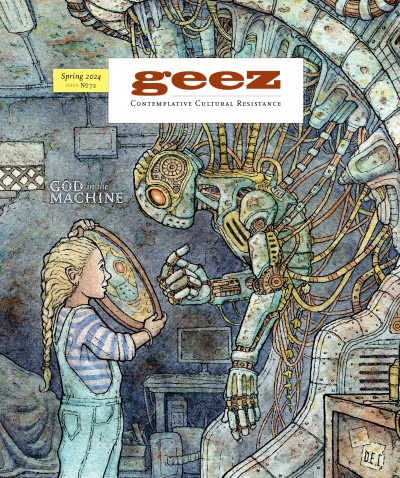Heaven in the Here and Now: A Conversation on Afrofuturism and AI with Philip Butler

Detail of “Dream Reality,” Creativepowerr, June 2023, Digital art, 3000 x 4000 pixels
Philip Butler believes it is necessary for us to question the things we claim to believe. Assistant professor of Theology and Black Posthuman Artificial Intelligence Systems at Iliff School of Theology, Butler’s work has intersected four areas: neuroscience, technology, spirituality, and Blackness. He is also the founder of the Seekr Project, a distinctly Black conversational artificial intelligence with mental health capacities.
In our conversation, Butler and I covered a vast array of topics from what led him to his research, to his relationship with the church, to his thoughts on society’s discomfort with AI, and his hopes for the Black community concerning technology and artificial intelligence.
Mashaun D. Simon: The work that you’re doing now, Afrofuturism work, where did the seed get planted?
Philip Butler: I used to like going to the previews more than going to the movies themselves. I went to the movies early one day, and it just so happened to be a preview for a documentary about the relationship between science fiction, the future, and the making of technology. The question that was posed in the preview for the documentary was, “What will the world look like in 80 years?” As I was sitting there I thought to myself, “I have no idea. But I want to have something to say about it.”
Mashaun: You graduate from Candler School of Theology, move out west, and you begin your studies at Claremont.
Philip: Yeah. Neuroscience was already an area of interest from playing sports in college. During the time of the George Zimmerman/Trayvon Martin trial, and the murder of Sandra Bland, I had these questions. The whole time I am doing my coursework, I am trying to ruminate on how I do this work and answer that question from that day in the movie theater for the people I claim who also claim me. I was like, if I do not like this present that I’m in, I need to start looking ahead.
Mashaun: What I am hearing you say is, you got to this point of asking, “How do I create a different future for us?”
Philip: Yeah.
Mashaun: In considering that, and considering that this issue wants to look at the relationship between faith, technology, and AI, why are we as a society struggling with what is seemingly inevitable?
Philip: Which society are you talking about?
Mashaun: I would say majority society. If our premise is that imagining beyond our reality and a different future is part of the practice of Black folks most specifically, then our struggle isn’t embracing the possibilities. Our struggle is access and permission, right?
Philip: What it says for me is that Black folks are expected to be along for the ride. Part of the basic premise of my first book, Black Transhuman Liberation Theology: Spirituality and Technology, is that if Black folks don’t get beyond using technology solely for consumption and move into the space where we make technology, then we’re always going to be the recipient of somebody else’s future. Black folk haven’t embraced technology and AI because we’re not actively making it in the ways I think we can, especially with the level of imagination that we have.
I also accept the idea of access. Fallon Wilson talks heavily about the ways Black folks have access to the Internet via mobile devices, but not through desktop or through laptops. Most tech is made on a desk or a laptop. Coding is much harder to do on the phone. It’s even harder to have stable, fast, high-speed Internet on the phone as well. And a laptop and a phone are not that much different in price, but the payment plan is different for the most part.
I think most folks push back on AI. If they have an opinion at all about it, [it] has more to do with fear around what it means to be a human, and by that I mean, like a dominant kind of apex predator in the world. The fears around AI stem from fears around aliens, which are also fears around being colonized, or at least being the thing that’s probed but not the thing that’s doing the probing. These barriers of entry are different and even the basis of apprehension are also different because they’re contextually oriented around, “Let’s not change the status quo” versus, “I’ve accepted what’s on the horizon, even though I may not necessarily be the ones making what’s on the horizon.” My part of the work is to get folks to buy into the fact that they can actually be the ones who are shifting what’s on the horizon, particularly Black folks, because that’s who I do this work for.
Mashaun: So what does that look like? How do we motivate Black folk, or make them more comfortable, when access is the issue, but the creativity or the desire is there?
Philip: There’s a couple of things that come up for me. At the turn of the 20th century, a lot of folks grew up in the church. But then, when they left and got their education they never came back. The space that helped make them was no longer a space that could fit who they became. Churches have resources. Maybe not every church, but many of them. Where’s the church computer lab? Where’s the church studio? Who is making use of all of the music equipment when no one is there? Who’s recording at the church? Buy a couple computers and create a computer lab and have the younger generation teach the older generation how to use them. Now you have some intergenerational things happening.
I’m going on seven years without a church. I haven’t been in church in a minute, and I don’t see myself going back. I have gone through several phases where I was like a straight up humanist. I am a post-humanist now, but even in that, on a baseline, I am a physicalist, meaning that whatever we have is what we have got. If you want to go to heaven, by all means, but that’s here. We can never leave earth because the matter that we have here is the same matter that is millions of miles away. If you ever thought heaven is somewhere else, wherever that is, it’s made of the same of what is here. When we talk about the ancestors, they have not left, they’re just in a different form.
This is part of the reason why I think the here and now is so important. The things that we’ve held near and dear have become the things that are holding us captive, I think. And as a result, we are not only losing touch with physical reality, but the people who live in everyday life – let alone the technologies that we can make because any technology that looks far enough away from our current understanding of the world looks like magic. Part of that’s going to have to come with us, not so much catching up with, but becoming informed on the things that make what looks like magic now, so that we can be the ones who become the progenitors of the new magic. If that makes sense.
Mashaun: Yeah, it does.
Philip: Whenever I do put on a theological hat, right – like it would probably be under a liberation school of sorts – you know there’s that question of like God having this preferential option, whether it be for Black folks or for the poor. But you look at society, and again, I think about the time I was in coursework. It did’t seem like it mattered if God cared, and if God did care, God wouldn’t do anything about it. Why are we clinging to like these ideas of what it means to almost be killed off? That’s not who I want to go hang out with forever if this person didn’t want to intervene and make themselves known.
Mashaun: How does that show up in the work you’re doing around Afrofuturism and AI? What considerations are there for theology and religion if that’s not where you are?
Philip: I’m at Iliff right now. Our approach to theology is centered on really asking the tough questions about the things that in many cases you’re not supposed to. The greatest level of commitment requires the highest level of critique or the highest level of scrutiny. If I’m to give my life to this thing then it owes me answers. And if I’m taking that seriously, I’m going to ask any and every question. My doing of theology is really the constructive aspects of asking those questions that shouldn’t be asked, that folks are afraid to ask.
Two or three questions ago you asked about churches, or people just in general. This is not to be like looking at fancy ways for people to get together, but I think it’s part of reimagining what it means for folks to congregate. People will still get together. People are going to congregate. How do we imagine congregating, especially when the folks who are congregating in church spaces are becoming older and older and smaller and smaller? I remember having conversations with Clemette Haskins back at Claremont and Clemette, who was once a chef, asked, “What does it mean to have supper club and have dialogue there?”
Mashaun: Congregating becomes that much more effective. It becomes that much more impactful.
Philip: What future do you want us to have? What future do you want to live into, even if you can’t see it? It reminds me of the mountaintop speech. Even if I can’t touch it, my work towards it suggests that I’ve already lived here so I’m living somewhere else that people may not know or be able to see, and maybe our kids will see it, or grandkids. But the idea is that on the road toward that space, if I don’t already exist in that world, in that timeline, then that timeline may not manifest.
It goes back to the “heaven is here” thing. When we manifest this thing, then how beautiful would it be to be able to sit back and watch as people carry on in the work, and catch the vision, so to speak, and embody the great thing that you’ve spilled your life for? Find what you love and let it kill you.
Mashaun D. Simon is a preacher, teacher, writer, and scholar – uncle, husband, son, and former pastor. He is a Doctor of Ministry candidate from Columbia Theological Seminary and resides in Stone Mountain, Georgia with his husband, Elvis.


Start the Discussion